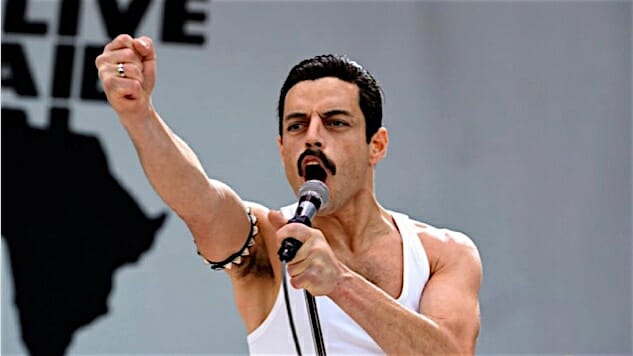Bohemian Rhapsody

Queen is such a powerhouse in rock history and Freddie Mercury such an artistic luminary that the mere representation of the band’s energy and impact makes Bohemian Rhapsody—an otherwise dull, by-the-numbers, mostly lifeless music biopic—tolerable, and even mildly effective at times. There are some individual moments and elements to like here, but taken as a whole, Bohemian Rhapsody is mostly a flatline with occasional blips of life here and there—and not nearly enough to bring the whole body back from the dead.
The film’s obvious piece de resistance is Rami Malek’s transcendent performance as Freddie Mercury. Malek’s was far from an easy task. Mercury’s public persona was one of a larger-than-life, boisterous voice, literally and figuratively. Yet he was known to have an introverted, melancholic personality in private, even when throwing lavish parties as attempts to find some form of an intimate connection with his surroundings. To successfully deliver a performance marked by such contrasts without coming across as gimmicky requires an agility that’s very tricky to accomplish, and Malek passes that test with flying colors.
More important than his technical prowess, Malek strikes what might be be described as the perfect spiritual tone in capturing Mercury’s passion for connecting intimately with his fans, the kind of connection he struggled to find in real life. His singular presence seems to capture Mercury’s soul—or at least our sense of what he must have been like—even as the painfully formulaic movie that surrounds him undermines the achievement. During a series of quick scenes that depict how “Bohemian Rhapsody,” a track that changed the face of rock forever, was recorded, Malek’s Mercury keeps exhorting his bandmates—“More passion!” “More feeling!” It’s as if we’re watching Malek himself begging the movie to match his emotional dedication and receiving very little back in the process.
Those moments that capture Queen’s innovative spirit as the band refused to be pegged to a particular genre or formula create some amusing and inspirational scenes, such as when it shows “Bohemian Rhapsody” the song being pieced together. As Mercury, Brian May (Gwilym Lee), Roger Taylor (Ben Hardy) and John Deacon (Joseph Mazello) put together some of their biggest hits, there is a potent chemistry between the actors and Queen’s attempts to find new ways to bond with their audience.
-

-

-

-

-

-

-

-

-

-

-

-

-

-

-

-

-

-

-

-

-

-

-

-

-

-

-

-

-

-

-

-

-

-

-

-

-

-

-

-








































